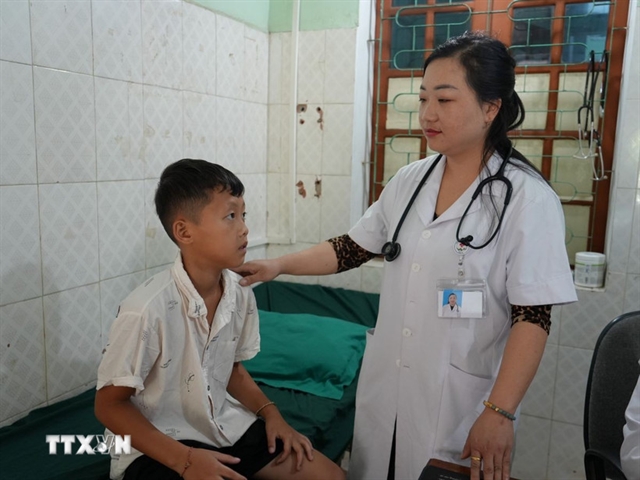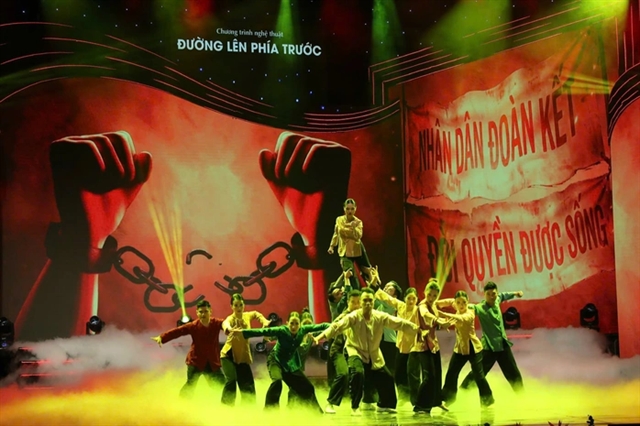 Society
Society

.jpeg) |
| Legal aid officials attend the training workshop. — Photos tienphong.vn |
THANH HOÁ — The Department of Law Dissemination, Education and Legal Aid under the Ministry of Justice organised a training workshop on legal aid skills for victims of domestic violence and ethnic minorities in the central province of Thanh Hóa.
It was held on October 13 as part of the World Bank–funded project 'Enhancing legal aid for the poor and vulnerable groups', supported by the Japan Social Development Fund.
Held in Hạc Thành Ward, the workshop brought together leaders and officials from provincial legal aid centres from various localities across the country – Thanh Hoá, Huế, Đà Nẵng, Khánh Hoà, Vĩnh Long, Bắc Ninh, Hà Tĩnh, Điện Biên, Lào Cai, Lai Châu, Quảng Trị, and Quảng Ngãi.
In her opening remarks, Vũ Thị Hường, deputy director of the Department of Law Dissemination, Education and Legal Aid, said since the Law on Legal Aid took effect in 2017, state legal aid centres nationwide have made continuous efforts to effectively provide legal counselling, representation and participation in legal proceedings for those entitled to free legal aid.
These include financially-disadvantaged victims of domestic violence and ethnic minorities living in areas with extremely-difficult socio-economic conditions, she said.
The provision of legal aid to these groups remains challenging in practice. Many people still lack adequate access to legal information and are not accustomed to seeking legal services when facing disputes or legal problems. Victims of domestic violence and ethnic minority people often feel hesitant and reluctant to approach legal authorities, she said.
Assisting such vulnerable groups requires legal aid providers to possess empathy, sensitivity and appropriate communication and behavioural skills to reach out and support them effectively, she said.
Given this context, Hường said that organising this training workshop is a practical activity to enhance professional competence and strengthen the skills of local legal aid providers.
It also offers participants an opportunity to exchange experiences, address challenges in handling legal aid cases and improve the quality of free legal services for disadvantaged groups, contributing to ensuring justice and access to the law for all.
.jpeg) |
| Lawyer Nguyễn Ngọc Lan, the workshop lecturer. |
The one-day workshop was conducted by Lawyer Nguyễn Ngọc Lan, director of Ngọc Lan & Associates Law Firm.
The sessions focused on two main topics: legal aid skills for victims of domestic violence and for ethnic minority people.
The lectures combined theoretical knowledge with insights into the psychology and living conditions of each group, closely linked with practical and case-based exercises.
In the morning, participants learned about identifying domestic violence and related legal policies for the victims.
Using a learner-centred approach, the trainer integrated real-life case studies and encouraged participants to research, present viewpoints and engage in group discussions.
The approach not only helped participants actively absorb knowledge but also apply it flexibly in practice.
Learners also attended a session on 'Counselling skills for victims of domestic violence in legal aid cases' where they practiced methods of approaching, listening, empathising with and guiding victims to exercise their legal rights.
The discussions became lively as participants shared real-life experiences and casework challenges faced by vulnerable individuals seeking legal help.
In the afternoon, the training shifted focus to legal aid for ethnic minorities - one of the main target groups of the legal aid policy who often face language barriers and cultural differences in accessing services.
The lecturer raised a guiding question “How can legal aid activities for this group be made more effective?”
Participants actively discussed practical challenges and shared experiences, identifying key issues and proposing solutions to improve legal aid effectiveness.
Following the discussion, the lecturer delved into counselling skills for ethnic minority clients in legal aid cases.
Through real-world scenarios, the session highlighted the need for legal aid providers to skilfully combine legal knowledge with an understanding of cultural and social factors when explaining, persuading and guiding clients.
An important strategy shared was close coordination with village elders, community leaders and respected figures to enhance outreach and effectiveness.
In closing, deputy director general Vũ Thị Hường acknowledged the participants’ suggestions and directed the organising committee to continue developing high-quality training programmes to further strengthen professional skills among legal aid providers. — VNS




